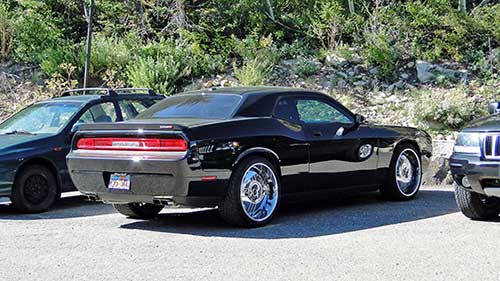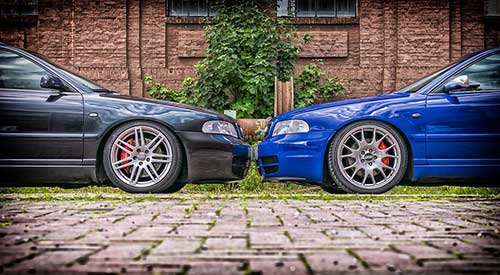I have seen and heard many drivers say that if they put bigger wheels on the car, the comfort disappears. Or, if they put higher tires, it increases comfort. What should we believe?
Let’s take, for example, a car that has, from the factory, 15-inch wheels installed. Obviously, because it is a car that is now driven only by enthusiasts, someone is thinking of changing its appearance with slightly larger wheels.
For example, to put some 18-inch wheels on it. It spoils, or not the comfort, compared to the 15-inch wheels that were initially installed?
When the car had original wheels, the width of the tire was 195 with a height of 60, for example. Later, with the much larger rims, tires had a wider width, because you just don’t put 195 on 18-inch rims, right?
More precisely, larger rims need to have wider tires, but with a smaller height, to keep the overall diameter of the wheel, otherwise, it would touch the wing or counter-wing. Let’s say you now have 225 wide 40-height tires.
Contents
Are bigger wheels better?
You will be surprised to notice that on the comfort side the car has not lost any quality. So, the potholes feel the same, the shocks are not transmitted more aggressively through the joints in the steering wheel and, if you didn’t know, you wouldn’t realize that you have other wheels.
Why? Because the tire is lost at the height, or elongation, but gained in width, and the impact with the obstacles is divided equally. Instead, there will be differences in fuel consumption, because larger wheels are heavier. Also, you will feel the change in maneuverability because the friction is increased and there is more resistance in the steering wheel. Luckily we have power steering.
One of the easiest ways to add individuality to a car is with a new set of bigger wheels that are very popular, especially on SUVs. Larger wheels, and rims, can benefit handling and performance. They can also make a car stand out.

So, in general, if you put bigger rims with wider tires, you will not feel major differences or not at all compared to some smaller rims, equipped with narrower tires. The shock is absorbed differently, in width, not in height, but on a similar surface.
Do bigger wheels increase speed?
Your car’s speedometer calculates how fast the vehicle moves depending on how fast the wheels turn. But larger wheels that rotate at the same speed as smaller ones will make the vehicle run faster.
Thus, switching to bigger wheels without adjusting the speedometer to compensate may cause you to go faster than the speedometer indicates.
This can create problems for systems such as the car’s anti-lock brakes and stability control programs, in addition to only leading to increased speeding fines.
Disadvantages of using bigger wheels on a car
We have to consider other more important shortcomings, as I said above. Because, if we replace some 15-inch wheels with some 18-inch ones, we will find that the running gear, the planetary gears, the gearbox, and the engine have to spin an additional 10-15 kilograms (22 – 33 lbs), sometimes even more.
This translates into increased fuel consumption. Maybe not significant, but 1 liter per 100 km, for sure. (235.215 mpg)
Another problem may be on the road. In general, a car with bigger rims and low height tires has a better grip, because the roll caused by the elasticity of the side walls decreases.
But in a normal car, we will not notice major differences, only if, simultaneously with the wider wheels, the car is equipped with sports shock absorbers.
Another disadvantage when we put bigger wheels on the car, not only with size, jumping from 15 to 16, but much bigger, due to extra weight on each axle, we will realize that everything related to the joints wears more quickly.
And here we refer to pivots and bushings, which are forced to receive shocks from a heavier wheel. It’s like holding a 0.5-liter bottle of juice in one hand, then exchanging it for a 2-liter one. It will tire your wrist faster.
The reason is simply that metal weighs much more than rubber and air. The suspension and braking systems of a car are designed to cope with a certain amount of “unlimited weight”.
If you intend to increase the weight of the wheel and tire, we recommend that you look at improving the suspension to cope with this extra weight.
The extra weight of the wheels makes the vehicle need more time to stop. Also, the thinner walls of the tire will not absorb as much impact as the older, larger tires.
This increases the impact caused by the impacts that the vehicle’s suspension system has to deal with. Thinner tires are especially problematic for larger and heavier SUVs.
When a vehicle hits a rock or part of a pit, the tire flexes under the weight of the impact. With a thin sidewall and a very heavy vehicle, the tires can get caught under the rim, damaging the tire and probably leading to an explosion.

Moreover, when the car is loaded with people or luggage, the tires may collide in parts of the car. Not only can it damage the tires, but it can cause unpredictable driving difficulties.
Increasing the size of your car’s total wheels can also mislead your car’s computer systems about how fast the vehicle is.
And last but not least, the brake problem. Let’s take for example the same BMW E36 car with the 318i engine, with full disc brakes on the front and drums on the rear axle.
These underperforming brakes were designed to stop a car with 195 wide tires. The larger, more powerful engines got both better brakes with rear discs and ventilated on the front, as well as wider tires.
But if we put some rims with 225 wide tires on the original 318i brakes, we are just playing with our lives. Because, due to the large grip of a wider tire than a narrow one, we risk overloading the brakes and waking up with broken calipers or broken hoses. Therefore, much larger wheels also require better brakes.
Conclusion
In conclusion, if you feel like switching to bigger wheels, you can do it without worries only if you keep a minimum of decency. You can go from 15 to 16 inches, maybe 17, and the width should also increase by 1-2 measures.
If you throw yourself, as many do, to go straight to some much bigger wheels, unfortunately, you have more problems than advantages. You may not lose comfort, but you can lose money and, in rare and extreme cases, put your life in danger.
